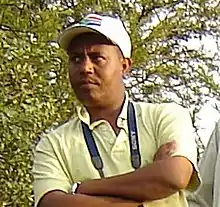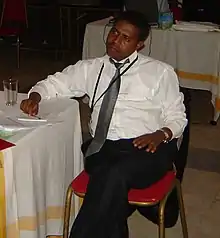Kindeya Gebrehiwot
Kindeya Gebrehiwot (born 1973) is an Ethiopian academic who is currently Professor of Forestry at Mekelle University (Ethiopia), undertaking research on forest regeneration, particularly frankincense trees. He studies the threats to this flagship species, particularly in relation to regrowth and tapping.[4] He was also President of Mekelle University.
Kindeya Gebrehiwot | |
|---|---|
 Kindeya Gebrehiwot | |
| President of Mekelle University | |
| In office 2013–2020 | |
| Preceded by | Joachim Herzig |
| Succeeded by | Fetien Abay[1][2] |
| Personal details | |
| Born | 1973 Abiy Addi |
| Residence | Mekelle, Ethiopia |
| Alma mater | Göttingen University [3] |
| Profession | Professor of Forestry |
Career

- 1996: MSc Environmental Forestry at University of Wales (Bangor)[5]
- 2003: PhD at University of Göttingen, Germany[4]
- 2013: Appointed as President of Mekelle University by Ethiopia's Ministry of Science and Education[6]
- 2017: Full Professor at Mekelle University[6]
Research on Ethiopia’s incense trees
Kindeya Gebrehiwot's research area encompasses sustainable management of dry tropical forests and reforestation. Such deciduous dry forests of the Sahelian regions are the poor parents when it comes to research on the ecology and conservation of natural resources, given their relatively lesser importance in terms of biological diversity. However, they play an extremely important role in ensuring the ecological balance in dry areas, in contributing to the diversity of natural habitats, in protecting soils from erosion, and in regulating the water cycle. These forests also contribute to the protection of the livelihoods of the inhabitants of Abergelle where the research is mainly conducted. The supply of energy, materials, food and commercial products is considered.[7]
Sustainable forest management that meets social, economic and environmental objectives requires an in-depth knowledge of how this type of forest ecosystem works. Studies have focused on resilience to withstand the pressures of exploitation, and regeneration capabilities. Kindeya's research makes an important contribution to improving this knowledge.[8] It is this knowledge that allows the Tigray society to tackle the problem of maintaining forest resources (especially Boswellia papyrifera incense species) in relation to their vulnerability (hydrological stress, grazing, and overexploitation, mainly). The economic importance of products from this species, particularly incense, must also be taken into account. Kindeya's research has identified a number of needs, not only in terms of future research, but also in terms of management plans and legal framework.[4] Realistically, Kindeya discussed the dilemma between the self-sufficiency needs of the neighbouring population: how to combine the exclosure of Boswellia forests with the need for people to support themselves in an area that is naturally very dry. Suggested solutions include a ban on access to livestock (exclosure) or even local restrictions on incense harvesting.[9]
Community service
- Board Chairman of Tigray Development Association[10]
- Board member of Mekelle 70 Enderta F.C.
Recognitions and awards
- 2004: Prize of the Belgian Development Cooperation[5]
- 2015: Award for his great and indispensable assistance in carrying out the Ethiopia-Witten relief efforts to equip and develop hospitals and schools in the northern Ethiopian province of Tigray[3]
- 2019: University of Hargeisa Medal[11]
External links
References
- Profile: Emergence of women-led universities in Ethiopia Addis Standard, 16 October 2020
- AWARD Fellow becomes female University President in Ethiopia
- Auszeichnung des Präsidenten der äthiopischen Universität Mekelle
- Why frankincense and myrrh are so expensive
- Laureates of the Prize of the Belgian Development Cooperation – Kindeya Gebrehiwot
- Mekelle University Board Approves Full Professorship Promotion of Dr. Kindeya Gebrehiwot and Dr. Gidey Yirga EthioGRI, 2/8/2017, Sandra Turner
- Kindeya Gebrehiwot: Introducing Boswellia papyrifera (Del.) Hochst and its non-timber forest product, frankincense
- Dryland agro-forestry strategy for Ethiopia, by K Gebrehiwot - ICRAF, Nairobi-Kenya, 2004
- A Negussie, R Aerts, K Gebrehiwot, B Muys - Journal of Arid Environments, 2008
- Ethiopia: Tigray Development Association Marks Silver Jubilee Nesru Jemal, Ethiopian Radio and Television Agency (Addis Ababa), 4 August 2014
- The 2019 University of Hargeisa Medal Goes to MU President
- Kindeya Gebrehiwot’s Publication list on Google Scholar
- Ecology and Management of Boswellia papyrifera (Del.) Hochst. Dry Forests in Tigray, Northern Ethiopia. 2003 University of Göttingen
_at_the_HighLand2006_excursion_to_Miheni_exclosure.jpg.webp)